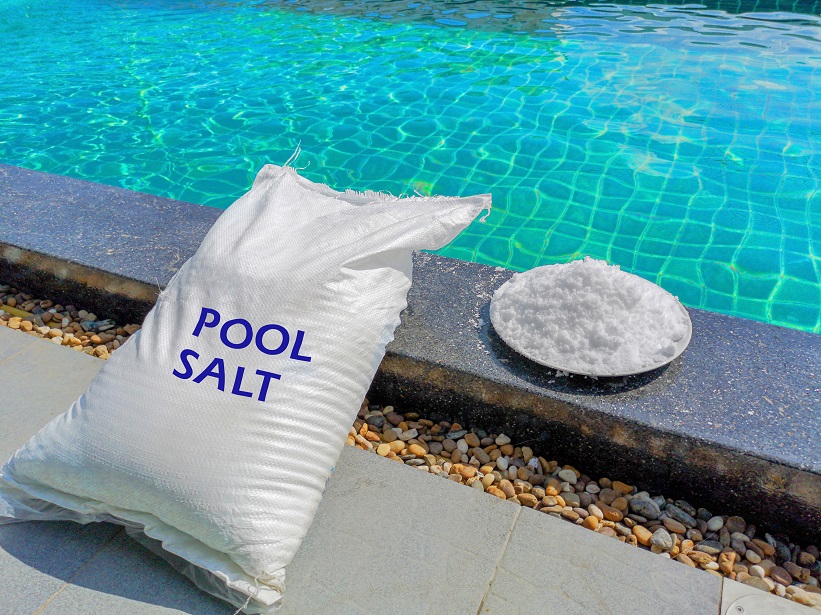Advantages of Salt Water Pools
There are several advantages to using a saltwater pools over traditional pools.
First, saltwater pools use less chlorine, which can cause skin irritation and damage to hair and nails.
Second, salt water does not evaporate as quickly as regular pools, meaning there is less of a need to add chemicals to maintain its quality.
Third, saltwater is naturally antibacterial, making it safe for children and pets.
Fourth, salt-based water has a low maintenance cost compared to traditional pools.
Traditional pools typically contain chlorine, which can cause skin irritation and damages hair and nails. Chlorine also evaporates faster than salt-based water, requiring frequent chemical additions to maintain its quality.
Chlorine can be dangerous for children and pets. Children can choke on the foam created by chlorine, and animals can ingest the chemical and become ill.
Saltwater pools contain sodium chloride, which is entirely natural and harmless. The salt content is similar to but less than that found in ocean water. The salt is also used to generate a small amount of chlorine to keep biologicals at bay.
Because salt-based water pools use salt to generate and complement chlorine, they require less chemical maintenance than traditional pools.
However, regular cleaning and the occasional addition of salt are needed to keep the pool clean and fresh.
Disadvantages of Salt-Based Pools
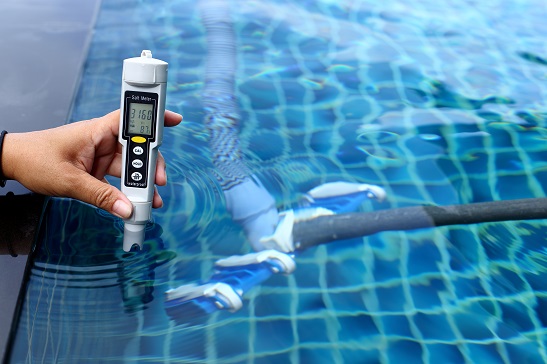
Although salt-based pools are safer than traditional pools, they still pose some risks. For example, salt-based water may dissolve rubber toys and equipment, so it’s essential to rinse any items before placing them into the pool thoroughly.
Salt-based pools are also more susceptible to algae growth. This problem can be reduced by regularly adding salt to the pool. However, too much salt can harm surrounding grass and plants when the pool overflows.
How Do Salt-based Pools Work?
A saltwater pool is not completely chlorine-free. It uses a chlorine generator instead of relying on chlorine added in other ways.
Saltwater swimming pools use dissolved salt in the water (salt) to create chlorine. The salt cell or electrolysis unit uses an electrochemical process to break down or separate the sodium chloride (salt) from the water.
Electrolysis creates chlorine in the form of salt water (sodium chloride) and hydrochloric acid. These sanitizing/disinfecting/oxidizing agents are the same thing as chlorine commonly used in pools in solid and powder form.
Why Is Salt Important?
Due to its excellent antibacterial properties, people use salt to preserve food, clean their homes, and make other products. Salt is also used to keep swimming pools clean and safe.
Salt reduces the chance of chlorine damage to tile and grout.
Salt keeps swimming pools clean and safe. It prevents the formation of algae in the pool. Algae create a cloudy appearance and fouls the water filter if not kept under control.
Salt also helps prevent the spread of harmful bacteria. Bacteria can cause skin rashes, respiratory infections, ear infections, and even stomach ulcers.
How Much Salt Should I Use?
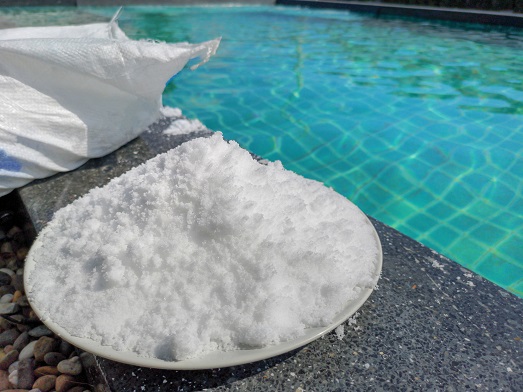
No exact amount of salt is needed to keep a swimming pool clean, but in general you should keep the level between 2,500 and 3,500 parts per million (ppm).
The best way to determine what amount of salt will work best for your pool is to test different amounts and watch the chlorinator unit which will display the latest ppm reading every few minutes.
If you have a large pool, you might want to add more salt until you get the right balance. Then you can gradually decrease the amount of salt as the pool gets cleaner.
You should also monitor the pH level of your pool. A higher pH often indicates that the pool needs more salt, to generate more chlorine.
Maintaining Your Saltwater Pool
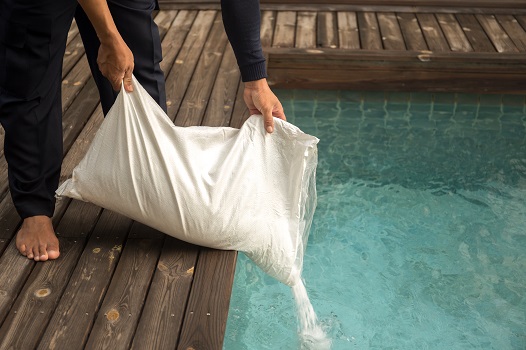
Regularly testing the pH level of your pool will help you maintain its health. You should test the pH every month. If necessary, you can adjust the pH using chemicals such as borax, vinegar, citric acid, or baking soda.
You should also check the salt content of your pool at least once per week. You can measure the salt content by weighing out a small sample of the pool water or by checking the chlorinator readout.
There are many ways to clean debris from a saltwater pool. Some people like to use automatic pool filters, while others prefer to manually remove debris from the pool using a suction-side pool filter or vacuum.
A pool filter system is also a must. Pool filters use a dedicated pump to circulate water through a filtration system made up of sand, gravel, and other materials. The filters require regular cleaning to ensure they are working properly.
Almost always, the pool pump used to push water through your chlorinator is the same one used to push water through your filter.
The type of filter system you use depends on how much maintenance you want to put into maintaining your pool and the types and amount of debris you will experience.
Manual cleaning methods involve removing debris from the pool by hand using a pool brush and a pole-mounted net filter.
You may also want to install a pool skimmer, which automatically removes debris from the surface of the pool.
The most important thing when it comes to keeping your pool healthy is to regularly test the pH level and salt content.
Best Salt-Based Above-Ground Water Pools
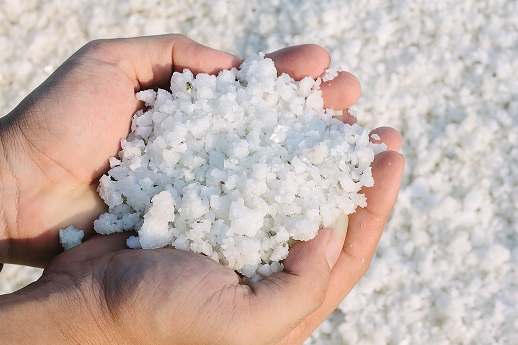
Here are some of the best salt-based above-ground pools available today.
1. Infinity® Saltwater Swimming Pool System
Infinity® Saltwater Swimming Pools offer a great alternative to traditional saltwater pools. They are made from polyethylene plastic and come in a variety of sizes.
They are designed to last for years without maintenance.
They are easy to install and maintain. You can easily replace filters, pumps, and skimmers.
2. AquaVue® Saltwater Swimming & Spa Pool Systems
AquaVue® SaltWater Swimming & Spa Pool systems are made from durable vinyl and aluminum materials. In addition, these pools are built to withstand heavy traffic.
They are affordable and energy-efficient. They require less than half the electricity of most saltwater pools.
3. Aquasalt® Saltwater Swimming and Spa Pool Systems
Aquasalt® Saltwater Pools are made from durable plastic and metal components. They are constructed using quality materials and manufacturing techniques.
These pools are strong and long-lasting. In addition, they are easy to install and repair.
4. Skyline® Saltwater Swimming/Spa Pool Systems
Skyline® Saltwater Swimmer/Spa Pools are made with durable stainless steel and fiberglass components.
These pools are sturdy and easy to install. In addition, they are designed to be maintenance-free.
5. Sunbrella® Saltwater Swimming Spas
Sunbrella® Saltwater Swimspas are made from high-quality fabrics and PVC components.
They are easy to install, maintain, and repair. In addition, they are highly resistant to fading and mildew.
6. AquaStar® Saltwater Swimming Spa Systems
AquaStar® Saltwater Swimmer Spas are made from durable plastic, fiberglass, and stainless steel components.
These pools provide excellent value and performance. In addition, they are easy to maintain and repair.
7. AquaSpa® Saltwater Swimming And Spa Pool Systems
Aqualife® Saltwater Swimming spas are made from durable polyethylene plastic and fiberglass components. They are easy to assemble and install.
8. AquaSpa® Plus Saltwater Swimming And Spas
AquaSpa® Plus Swimming Pools are made from tough, corrosion-resistant polypropylene plastic and stainless steel components. They are designed to last for many years.
FAQs
Q: What is the difference between an above-ground swimming pool and a spa?
An: An above-ground swimming pool is basically a larger version of Jacuzzi or hot tub – without the heater.
It’s usually installed on the ground, in a deck, or on a patio. If needed, the water is heated by solar panels, gas heaters, or electric heaters.
Q: How do I choose the right size pool for my home?
A: To determine how big you need, measure the area where you plan to put your new pool.
Add about 10 percent all around the perimeter for safety reasons. Then add more space as needed for recreational purposes.
Q: Can I use a saltwater pool instead of a chlorine pool?
A: Yes! Saltwater pools still produce chlorine, but they don’t require as much nor as many harmful chemicals. However, they still require regular cleaning and care.
Q: Do I have to buy special equipment for a saltwater pool?
A: No. Most saltwater pools come with everything you need to get started. The main difference is the addition of an ionic chlorinator which uses electricity to separate the chlorine from salt.
Q: How much does it cost to build a saltwater pool? Is it expensive?
A: Building a saltwater pool is no more expensive than building a chlorinated pool in most situations.
Q: Where should I place my saltwater pool?
A: If you live in a cold climate, consider installing your pool near a south-facing open yard with no trees overhead. This will help keep your pool warmer during the summer months.
Q: Will my neighbors complain about the noise?
A: This depends on where you locate your pool pump and other motor-driven equipment. Noise from a saltwater pool isn’t any louder than other pools.
Q: Does a saltwater pool need a lot of maintenance?
A: Saltwater pools require less chemical maintenance than traditional chlorine pools. You just need to clean them regularly and add a few bags of salt to your water from time to time.
Q: Why would I choose a saltwater pool over a traditional pool?
A: Salt water pools are better than traditional pools because they don’t require as much harsh chlorine to keep the water clean.

